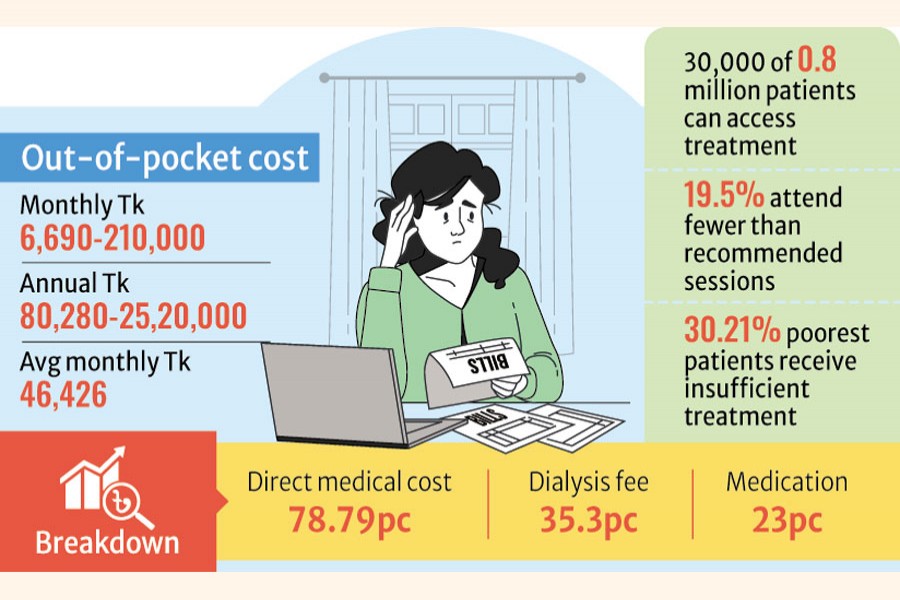
Published :
Updated :

The financial burden of kidney dialysis in Bangladesh has reached alarming levels, with a recent study by the Bangladesh Institute of Development Studies (BIDS) revealing some 92.87 per cent of households with dialysis patients face severe financial distress to afford the treatment.
The study titled "Out of Pocket of Kidney Dialysis in Bangladesh" was presented on Monday at the Annual BIDS Conference on Development 2024 in a Dhaka hotel.
It found that the average monthly out-of-pocket cost of dialysis is Tk 46,426, with expenses ranging from Tk 6,690 to a staggering Tk 210,000. On an annual basis, such expenses range between Tk 80,280 and Tk 25,20,000.
The high costs are primarily driven by direct medical expenses, which constitute 78.79 per cent of the total treatment costs. Dialysis fees alone account for 35.3 per cent of the total cost, followed by medication expenses at 23 per cent.
Abdur Razzaque Sarker, a research fellow at BIDS, presented the study during a session focused on education and health.
He pointed out that only 30,000 out of nearly 0.8 million patients requiring dialysis in Bangladesh can access the life-saving treatment, largely due to financial and logistical barriers.
The essential role of dialysis in sustaining life for patients whose kidney function has dropped to 10-15 per cent was underscored by the study. Dialysis serves to remove waste and excess fluids from the blood, providing a critical lifeline for patients.
Nearly 90 per cent of households with dialysis patients face catastrophic health expenditures, with 19.5 per cent attending fewer dialysis sessions than medically recommended.
The burden is particularly acute for low-income families, with 30.21 per cent of the poorest patients receiving insufficient treatment due to prohibitive costs.
The study drew its findings from a survey of 477 hospitalised patients across public, private, and non-government organisation (NGO)-operated healthcare facilities conducted between November and December 2023.
In light of the dire situation, Sarker called for immediate reforms to alleviate the financial strain on the affected families. He urged the government to establish dialysis facilities in district hospitals and subsidise private hospital services to make treatment more affordable.
"Dialysis facilities must be made affordable for resource-poor households," he stated, emphasising the urgent need for accessibility.
The research fellow also recommended including kidney patients in social safety net programmes and introducing insurance coverage for dialysis to reduce their financial burden.
Additionally, he suggested state-owned pharmaceutical companies begin producing expensive treatment drugs domestically to lower costs.
Sarker further proposed increasing budgetary allocations for healthcare to shield families from the devastating financial shocks associated with dialysis.
The study's findings underscore the urgent need for systemic reforms to address the financial challenges faced by dialysis patients in Bangladesh, ensuring that this essential treatment becomes accessible to all who need it.
bdsmile@gmail.com


 For all latest news, follow The Financial Express Google News channel.
For all latest news, follow The Financial Express Google News channel.